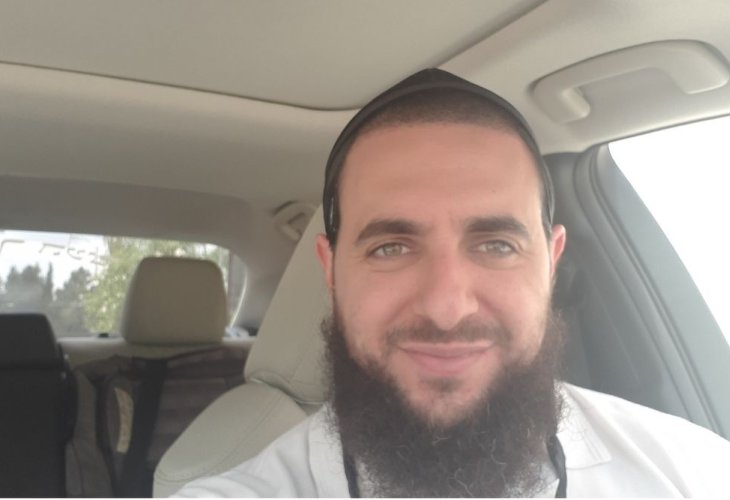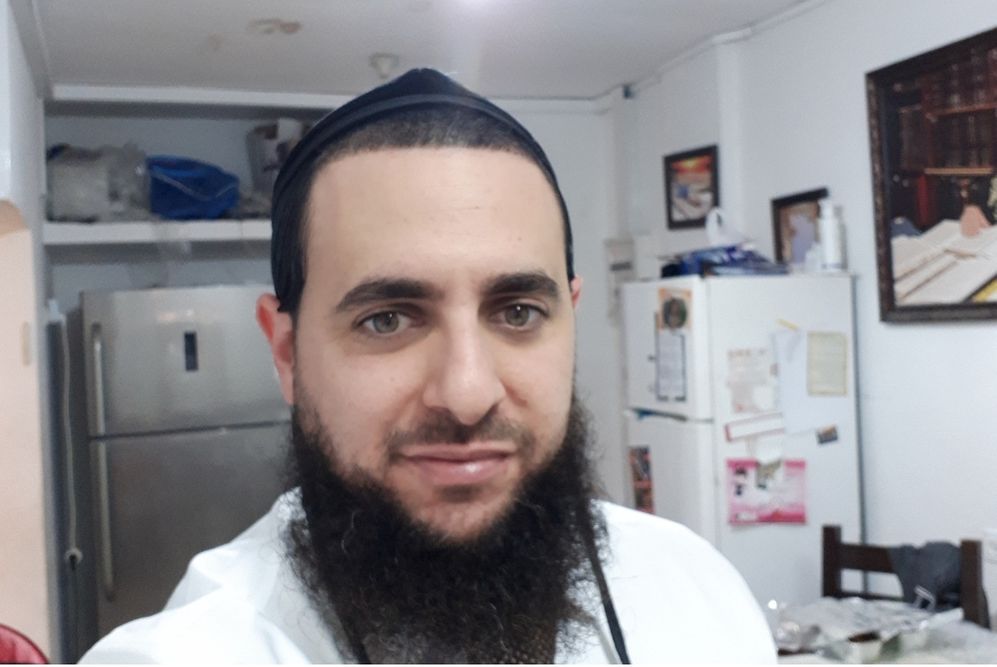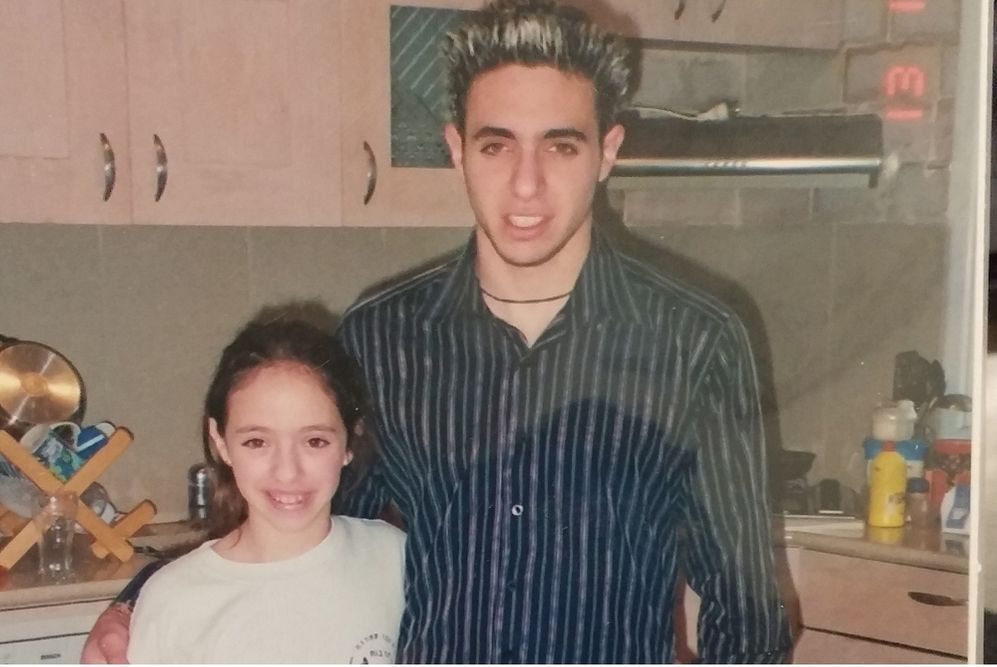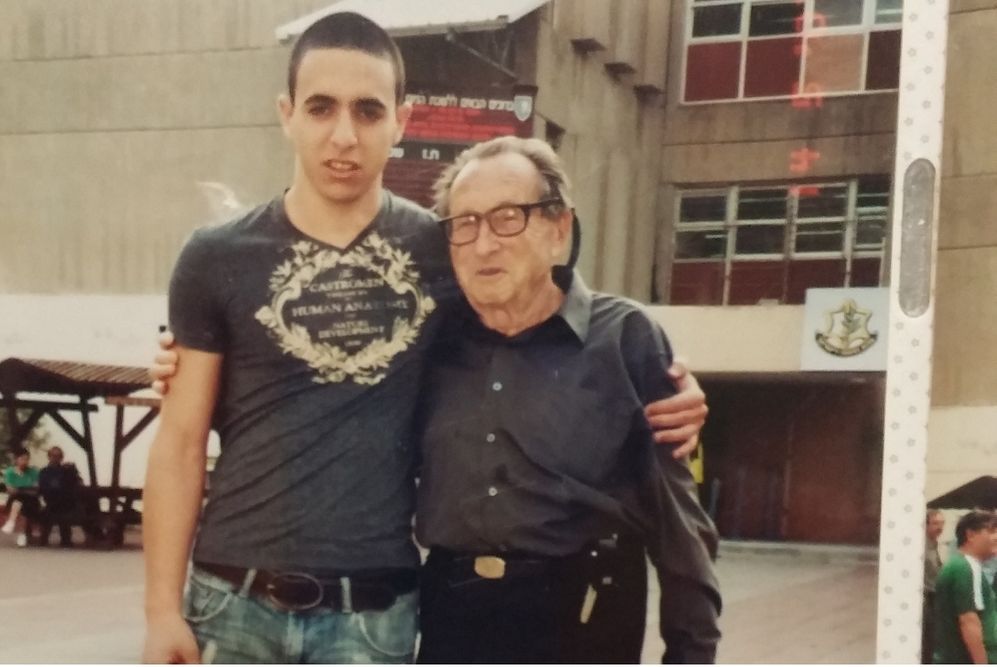"I am a College Lecturer and a Yeshiva Student, For Me It's a Mission"
Eliahu (Eli Ran) Hirsch is a lecturer in the Faculty of Sciences in Holon and also leads his life as a yeshiva student. "When I come to lectures, the students look shocked, it's an opportunity for me to explain a thing or two about Judaism." And what do the professors at the college say about this?

It happens at the start of every new academic year: students at the Faculty of Sciences at HIT College in Holon enter the course of lecturer Eliran (Eliahu) Hirsch. At first, they don't think anything special awaits them besides studying the course material and intensive exercises. However, then the lecturer enters the classroom, leaving them stunned.
The lecturer Eliran, who is Eliahu Hirsch, is the only Haredi (ultra-Orthodox) lecturer at the college. "It's not just that I'm Haredi, but I also don't bother to hide it," he states with a smile that can't be misinterpreted. "Why should I try to hide? Let them see me with the beard, with the kippah, I have nothing to hide."
How do the students react?
"In the first minutes, they are really in shock," he admits. "These are usually large classes of between 50 to 60 students, which I teach face-to-face. But very quickly, we move on to discussing professional topics, and then I see how the natural shock turns into paying attention to the lecture. I've been working at the college for five years, taught thousands of students, and among all of them, there may have been one student who made an inappropriate comment, and even with him, I managed to cut it short quickly."

"I Closed the Book and Ran Away"
Perhaps the fact that Eliahu always manages to find the right reaction and restrain the shocked students at the right moment is related to his past when he too stood on the other side, barely familiar with Judaism and its significance.
"I grew up in a secular home, in Rishon Lezion," he says. "Sometimes on Shabbat we made kiddush and on Yom Kippur we tried to fast, but not more than that. When I reached high school age, I was a bit exposed to the world of Judaism by friends who started talking about topics related to religion. But I must admit it didn't interest me much, at that time I was very anti, I didn't feel a direct connection to the topic."
But then came the day when the anti-wall cracked. "It happened when one of my friends approached me and said: 'Okay, I understand there are certain things you don't believe in, but you yourself admit there are things you do believe exist, so why don't you observe them?' That sentence echoed in my head for a while, it was true and very compelling. I felt like I was behaving like a hypocrite."
High school years went by, and at their end, Eliahu enlisted in an elite military unit. There, during the service, the book 'The Revolution' by Rabbi Zamir Cohen fell into his hands. "I started reading and suddenly got scared," he recalls, "I realized there was truth here and was afraid of that truth. I closed the book even before I finished reading it and decided I wouldn't go back to it. I couldn't imagine myself making such a significant change in my life, I didn't want to think about it at all."

Given your current appearance, it's clear the book made an impact...
"Of course it did, I couldn't escape it. Everywhere I went, I thought about what I read and this subject occupied me constantly. I would ride buses and see people with beards and kippahs. I tried to imagine myself looking like one of them and wondered if that was really what's required of me, and maybe the true truth is indeed with them? I would see stray dogs and animals on the street and think to myself that even though a dog and a cat have tongues and teeth, they can't speak or think. We humans have a significant advantage over animals. Why were we created this way? There must be a reason.
"I used to see the sun rising in the morning and start pondering how it rises precisely, lights up the world, yet doesn't freeze or burn us to death. All these thoughts brought me closer to the truth, and I began to realize that I was interested in Judaism and it attracted me to it. However, I was still disconnected and fearful. When people around me asked if I was returning to religion, I told them unequivocally: 'I am strengthening, but not yet returning.'"
Meanwhile, one of his sisters returned to religion, and another sister followed the same path. "I would have long conversations with my younger sister, who is a year younger than me. She strengthened me and answered many of my questions, which gradually seeped in and made me understand that the truth is only one, and there's no escaping it," Eliahu says.
From the army, he was released with a kippah on his head, feeling he was just at the beginning of the process. Later he established his home, and a daughter was born to him, but the relationship ended after a while. He remarried a woman with three children whose father had passed away. "I suddenly became the father of a large family, and very quickly, we had a daughter together too, who brought us great light," he says.
All this process was certainly not easy. What helped you overcome the difficulties?
"From the moment I began to get closer, I decided I wouldn't do anything with a 'bang and it's over'," he details, "The process went on slowly and gradually. Each time I took on something new, but only when I felt completely ready for it. For example, I attended religious studies lessons intended for secular guys for a long time. One day I decided to start wearing tzizit, and then they wouldn't let me into the lessons anymore because 'they're not for religious people.' At that moment, I knew I could move to the next stage. So, the external stages of wearing a kippah and side curls, which are supposedly the most difficult, I reached when I was mentally prepared and firm. I no longer cared what people thought of me in the street.
"I'm aware that in my environment I looked very strange, one of the most bizarre stories, but from my perspective, it was necessary. Every day I wake up in the morning and thank Hashem for bringing me to this place. It chills me to think how many days and years I might have desecrated Shabbat and done the most severe things in the Torah without realizing the gravity of my actions. I feel that Hashem really shined his light on me, helping me see the world in the light of Judaism and decide to rise and take action."
And how did your parents react to your return to religion?
"As I mentioned, not only I returned to religion, but also two out of my three sisters. At first, it wasn't easy for the parents; after all, it's not easy to see the son you raised change and grow a beard and side curls. But over time, they began to adapt. Today, my mother herself is already diligent in wearing skirts, and my father puts on tefillin and blesses the lulav."

"They Are Not Deniers, They Are Simply Disconnected"
Several years ago, Eliahu completed his degree in computer science and began working at HIT College in Holon as a lecturer and tutor in the Faculty of Sciences. "My position at the college is full-time," he clarifies, "and in addition to that, I regularly study halacha in a yeshiva daily."
How do you manage to combine such different things?
"It indeed seems like an impossible combination because these are completely different things. When I lecture, I am not a yeshiva student, and when I study in the yeshiva, I don't think about the material I teach at college. What they have in common is the fact that I do them as part of Hashem's will. I know that Hashem wants me to fulfill my purpose in the world – to support my family and study Torah, which is the most important thing."
"In addition," he says, "I believe that it's no coincidence that Hashem led me to the college, as I have been privileged to touch quite a few hearts precisely because I'm in such a place. Not only do the students ask me about Judaism, but the lecturers occasionally approach me as well, wanting to hear and engage. There are even those to whom I send halachot daily. Whenever they approach me and start asking, I tell them: 'Come, tell me what interests you, let me know what is unclear to you, and I will answer you all.'"
Aren't you afraid they will ask you questions you don't know the answers to?
"Hashem granted me holy courage. I am not afraid to confront even senior lecturers and professors. Over time, I discovered something very interesting – once you are confident in yourself and your answers, then the professors become very uncertain. It turns out they might be anti- and not connected to Judaism, but it doesn't necessarily come from a place of denial; they are simply influenced by the media. When I explain to them that I thought just like them a few years ago, asked exactly the same questions and also got answers – they understand that there might be truth here. It's not that everyone decides in one day to change their lives, but they are certainly open to hearing, and many of them understand that the truth does not lie with them."
And what do you have to say about the younger generation? Is there also interest among the students?
"What I see on the ground is that especially nowadays, during the coronavirus period, the youth have started to look at life with a different perspective. They are more open to receiving than they used to be and have more free time to listen and understand at their leisure."
One of the things common to his students is, in his opinion, the fact that they do not understand that Judaism is obligatory. "I meet again and again youth who come with the feeling that 'I have faith in Hashem and I try to do good deeds, that's enough to fulfill Hashem's will.' In their eyes, religious people do 'extra', more than necessary. They don't understand for a moment that being Jewish is something that compels, that you can't believe in Hashem without observing his commandments."
"When I talk to the students, I tell them about myself, how when I was about to undergo an officers' course, I would stand by the mezuzah and ask Hashem to help me pass the course. I didn't understand at all that my faith in Hashem wasn't enough and that I needed to do much more than that."
"Unfortunately, there are also those who are more distant, who don't understand at all the meaning of Hashem's existence in the world. With them, of course, you need to start from the beginning. The conversations, of course, differ from each other, but the conclusion of all of them is one and the same – Hashem gave each of us a mission in the world, and we cannot ignore it. In the end, that's our aim, and we need to think about how to implement it."

